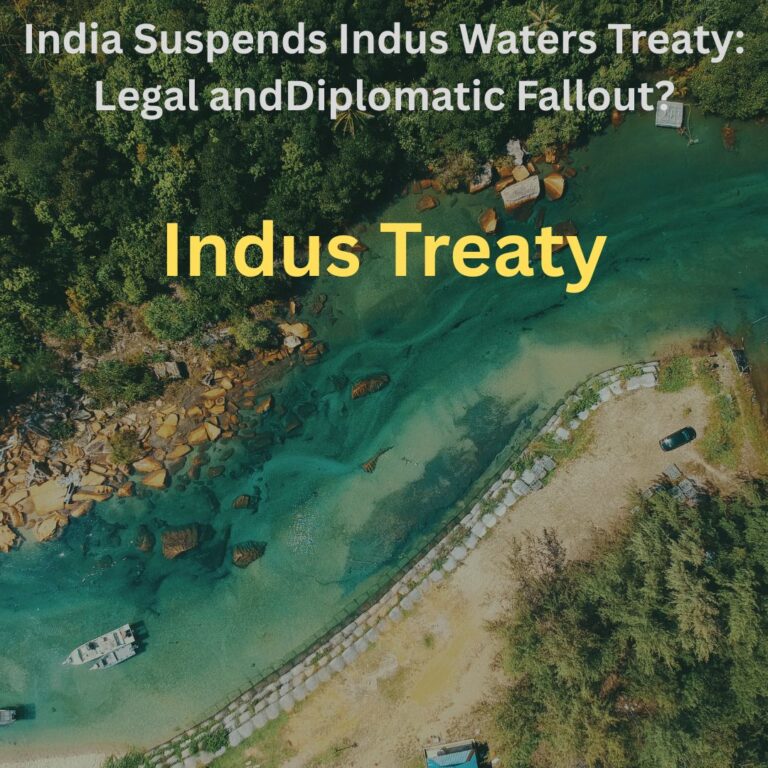A Treaty Without an Expiry: Can India Suspend the Indus Waters Treaty?
The Indus Waters Treaty of 1960 is widely regarded as one of the most resilient water-sharing
agreements in the world. Brokered by the World Bank, this treaty has withstood three wars and
numerous military standoffs between India and Pakistan.
However, following the Pahalgam terrorattack in April 2025, India announced that it would hold the treaty in abeyance—a decision that hasstirred a storm of controversy in the international legal and diplomatic communities.
According to the World Bank, the treaty remains legally binding unless both countries agree to
terminate or replace it.
�� Understanding the Indus Waters Treaty
The Indus Waters Treaty covers six rivers shared by India and Pakistan:
Eastern Rivers (India’s share): Sutlej, Beas, Ravi
Western Rivers (Pakistan’s share): Indus, Jhelum, Chenab
A unique aspect of the treaty is its perpetual nature. Article XII (4) clearly states:
“The provisions of this Treaty… shall continue in force until terminated by a duly ratified treaty concluded
for that purpose between the two Governments.”
This means no unilateral termination or suspension is allowed. Changes require mutual consent and
formal ratification.
⚖️ India’s Legal Justification for Suspension
India claims that Pakistan’s alleged support for cross-border terrorism constitutes a “fundamental
change in circumstances” under Article 62 of the Vienna Convention on the Law of Treaties (1969). The
government cited the Pahalgam attack, allegedly carried out by a Lashkar-e-Taiba-affiliated group, as a
trigger.
India argues that treaties cannot bind parties when core conditions of cooperation—such as peace and
security—have fundamentally changed.
���� Pakistan’s Response: A Breach of International Law
Pakistan strongly rebuked India’s move, calling it:
A “flagrant breach of international law”
An “act of war”
A violation of the treaty’s legal sanctity
Pakistan insists that abeyance is not a legally recognized status under the treaty and that only mutual
termination or modification is permissible.
��️ Role of the World Bank and International Law
The World Bank, as the treaty’s guarantor, is not empowered to change its provisions but can mediate
disputes through the Permanent Indus Commission (PIC). Pakistan could escalate the matter to the
International Court of Justice (ICJ) or even the UN Security Council.
International law experts warn that unless a material breach is proven, India’s unilateral suspension
could backfire diplomatically and legally.
�� Consequences of the Suspension
- Immediate Impacts
India may stop sharing hydrological data, violating Article VI.
Fast-tracking of controversial dams like Kishanganga and Ratle.
Pakistan may retaliate by blocking trade or air routes. - Long-Term Threats
Water scarcity in Pakistan (80% agriculture relies on Indus waters).
Nuclear escalation risks as Pakistan’s Prime Minister called the move an “act of war.”
Global backlash with potential intervention by the US, EU, and China.
�� What Lies Ahead for the Indus Waters Treaty?
The most likely outcome is a temporary suspension followed by negotiations, possibly mediated by the
World Bank. But the worst-case scenario—a full-blown water conflict between nuclear states—is a
chilling prospect.
�� Lessons from History
- Treaties without expiration require mutual trust and consent to adapt.
- Unilateral action undermines global treaty norms.
- Weaponizing water risks humanitarian and geopolitical disaster.
Read Full treaty
https://treaties.un.org/doc/Publication/UNTs/Volume%20419/volume-419-I-6032-English.pdf
�� What Do You Think?
Should treaties like the Indus Waters Treaty allow for unilateral suspension in case of terrorism or
conflict? Or should international law always demand mutual agreement?
Comment below and share your views.




